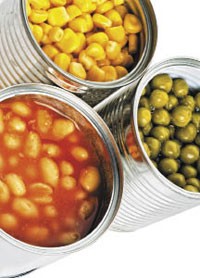Advertisement
Grab your lab coat. Let's get started
Welcome!
Welcome!
Create an account below to get 6 C&EN articles per month, receive newsletters and more - all free.
It seems this is your first time logging in online. Please enter the following information to continue.
As an ACS member you automatically get access to this site. All we need is few more details to create your reading experience.
Not you? Sign in with a different account.
Not you? Sign in with a different account.
ERROR 1
ERROR 1
ERROR 2
ERROR 2
ERROR 2
ERROR 2
ERROR 2
Password and Confirm password must match.
If you have an ACS member number, please enter it here so we can link this account to your membership. (optional)
ERROR 2
ACS values your privacy. By submitting your information, you are gaining access to C&EN and subscribing to our weekly newsletter. We use the information you provide to make your reading experience better, and we will never sell your data to third party members.
Environment
Banning Bisphenol A In Baby Bottles
Canada moves toward restricting the chemical; Congress proposes similar legislation
by Susan R. Morrissey
April 23, 2008
Canada is about to become the first country in the world to set exposure limits on bisphenol A (BPA). The proposed ban targets the importation and sale of baby bottles containing BPA.
"Although our science tells us exposure levels to newborns and infants are below the levels that cause effects, it is better to be safe than sorry," said Canadian Minister of Health Tony Clement in announcing the action. He added that barring any compelling information brought to light during the comment period that started on April 19, the ban will go into effect in mid-June.
Canada's decision to ban BPA in baby bottles is based on a risk assessment of the chemical by Canada Health, the country's FDA-like agency. The study found that BPA is not a concern for adults but may pose a risk for newborns and infants. In addition to the new regulations, Clement also noted that Canada Health will support more studies to assess the chemical's impact on mothers and babies.
Meanwhile, in the U.S., members of Congress are considering putting in place similar limits on BPA based on a recent National Toxicology Program study (C&EN, April 21, page 11). Sen. Charles E. Schumer (D-N.Y.) announced plans to introduce legislation to ban BPA in all children???s products and "food contact" containers, such as some water bottles and polymer-lined cans.
"There have been enough warning signs about the dangers of this chemical that we cannot wait to act," Schumer said in a statement. "If there is any serious risk to all posed by this chemical, it is simply unacceptable to allow Americans, especially vulnerable infants, to come into contact with it."
On the House side, the Energy & Commerce Committee, led by Reps. John D. Dingell (D-Mich.) and Bart Stupak (D-Mich.), is investigating the safety of BPA in baby products as part of its oversight of FDA.
"We will continue to conduct vigorous oversight and will continue to question FDA about its decision finding bisphenol A is safe for infant and baby products," Stupak said. "We also plan to contact manufacturers of liquid infant formula and ask them to remove BPA from their products."




Join the conversation
Contact the reporter
Submit a Letter to the Editor for publication
Engage with us on Twitter